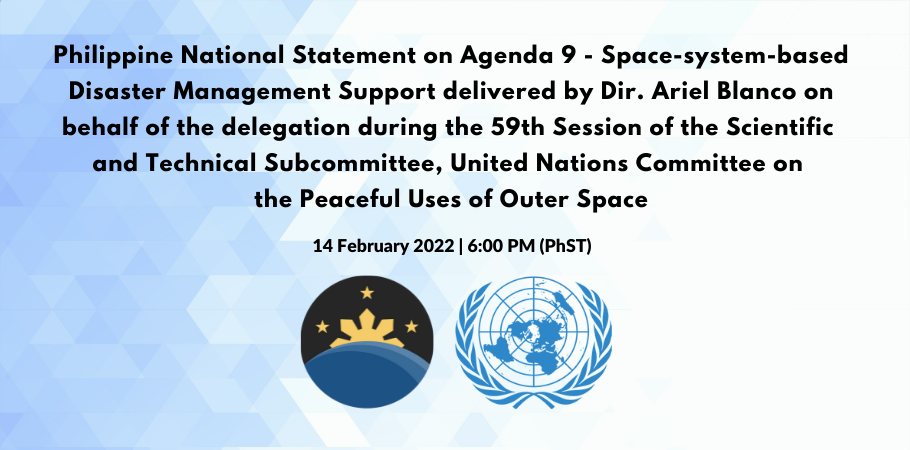59TH SESSION OF THE SCIENTIFIC AND TECHNICAL SUBCOMMITTEE OF THE
UNITED NATIONS COMMITTEE ON THE PEACEFUL USES OF OUTER SPACE
PHILIPPINE NATIONAL STATEMENT
AGENDA ITEM NO. 9 “SPACE-SYSTEM-BASED DISASTER MANAGEMENT SUPPORT”
14 FEBRUARY 2022 | 11 AM – 1 PM CET | VIA INTERPREFY
delivered by
ARIEL C. BLANCO, Dr.Eng.
DIRECTOR, SPACE INFORMATION INFRASTRUCTURE BUREAU
PHILIPPINE SPACE AGENCY (PhilSA)

Thank you, Chair.
Chair and distinguished delegates,
The Philippines is among the most vulnerable countries to the devastating impacts of natural disasters, ranking eighth (8th) out of 181 according to the 2021 WorldRiskIndex.¹ Our unique geographic location in the Pacific Ring of Fire is a major contributing factor with the adverse effects now exacerbated by climate change and the ongoing global pandemic.
While our country continues to strengthen its capabilities, we have learned how the scale and impact of natural disasters can render our ground-based infrastructure and resources futile, resulting in serious setbacks in response and recovery.
Such is the case when the Philippines was hit in December 2021 by Super Typhoon Rai (local name: Odette), a Category 5 Typhoon and one of the strongest recorded for the year. While preemptive measures were undertaken by the government, the ferocity of Typhoon Rai still resulted in a record number of fatalities and significant damage to property and critical infrastructure. Until today, our countrymen continue to suffer from the effects of this disaster.
As super typhoons are becoming a common occurrence in our area of the world due to climate change, space-based disaster management support has been a breakthrough and an indispensable tool for disaster preparedness and response in the Philippines. With strategic planning to withstand the adverse effects of local phenomena, space systems enable reliable and real-time satellite data that is critical to support first responders and important stakeholders in weather monitoring, early warning, mapping, search and rescue, and in other similar efforts.
In the case of Typhoon Rai, some of the data used were sourced from our sovereign satellites, including Diwata-2.
We also greatly benefitted from the data from our partners. For Typhoon Rai, the Philippines activated the International Charter for Space and Major Disasters on 16 December 2021 – made possible by the support of partners from various UN bodies, including the United Nations Institute for Training and Research (UNITAR), the United Nations Satellite Centre (UNOSAT), and the United Nations Economic and Social Commission for Asia and the Pacific (UNESCAP). Through the activation, the Philippines was able to benefit from maps used for damage assessment and disaster response.
In addition, readily accessible VIRS/NPP data were also used to generate nighttime light maps to assess the extent and rate of restoration of electric supply in the affected areas.
The Philippine Space Agency (PhilSA) is committed to strengthening its space-based initiatives for disaster risk management, response, and climate action by cooperating with partners as well as assisting and capacitating frontline agencies and responders both at the national and local government levels.
Foremost among our partners is the Office for Outer Space Affairs (OOSA). Through the Memorandum of Understanding that we signed in June 2021, PhilSA is now closely working with the UN-SPIDER Program for a Technical Advisory Mission in the Philippines this year. The Technical Advisory Mission will complement our national efforts and Key Development Areas, help identify gaps, and promote well-coordinated response among various institutions with the use of space science and technology.
PhilSA also participated in the World Space Forum 2021 with the theme ‘Space4Climate Action’ co-organized by OOSA and Austria. During the forum’s space agencies panel, PhilSA highlighted the Philippines’ space-related initiatives for climate action and disaster risk reduction and management, toward helping the country achieve the 2030 UN Sustainable Development Goals (SDGs).
In this regard, the Philippine delegation expresses its utmost appreciation of Director Simonetta Di Pippo for her unwavering support to the Philippine space program as highlighted by our partnership and many activities together under her term as OOSA Director. We wish her all the best in her future endeavors.
Finally, the Philippines welcomes the General Assembly’s decision to adopt the Space2030 Agenda, which highlights the role of the peaceful uses of outer space in achieving the 2030 SDGs, the Sendai Framework for Disaster Risk Reduction, and the Paris Agreement.
In conclusion, Chair, we continue to express our openness to work with international partners on initiatives that further strengthen our capabilities and augment existing efforts to address climate change and its impacts through space applications.
Thank you very much.
— END —
¹https://www.bworldonline.com/philippines-ranks-eighth-most-at-risk-country-for-disasters/
https://reliefweb.int/sites/reliefweb.int/files/resources/2021-world-risk-report.pdf




